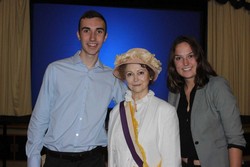As part of its Black History Month programming, Monmouth’s African Diaspora Studies (ADS) Program, presented “Black Women and Resistance,” on Thursday, Feb. 23. The event featured presentations from three Monmouth faculty and closed with a panel Q&A.
Julius Adekunle, Ph.D., Professor for the Department of History and Anthropology and Director of the ADS Program, presented “African Women: Political Activism and Empowerment;” , Lauren Rorie, Adjunct for the Department of History and Anthropology, presented “The 1929 Aba Women’s War;” and Hettie Williams, Ph.D., Associate Professor for the Department of History and Anthropology, concluded with “Black Women and the Mau Mau Rebellion.”
Adekunle kicked off the event with stories of three African, aristocratic women, each of whom was directly responsible for resisting European domination. He introduced, “Women were involved in resisting the Europeans to preserve their culture, their dignity, their integrity, their power, their status. It is apparent that women didn’t just fold their hands and say, ‘The men should do it.’ They worked with the men, and they both resisted the Europeans.”
He continued to detail the impacts made by Empress Taytu of Ethiopia (1851-1918), Queen Mother Yaa Asantewaa of the Asante Empire (mid 1800s-1921), and Chief Funmilayo Ransome-Kuti of Nigeria (1900-1978).
In giving an example of these women’s influence on politics, Adekunle explained, “Because she [Empress Taytu] was more or less a nationalist, she played a significant role in preserving Ethiopia as a nation.”
Rorie, who was recently granted a full-ride scholarship in pursuit of her Ph.D. at Rutgers University, expanded on the purpose of resistance in her talk. “Europeans went into Africa and claimed ownership over the land, resources, and the people. Africans were expected to work and mine resources for low, poor wages, practically free labor,” Rorie began. “Just to offer an example, take King Leopold and the Belgian Congo: he ruled with fear and terror, forcing the Congolese people to harvest rubber or face death. He would even chop off their limbs. And in other cases, women were taken hostage. Many of them starved to death while the men were sent to gather this monthly quota of rubber. It’s important to understand the sentiments of the African people, the environment in which they lived, and how it really served as a catalyst for anti-colonial resistance across the continent.”
Continuing on the topic of of women’s political resistance in Africa, Rorie discussed the 1929 Aba Women’s War in Nigeria. And Williams later pointed out, this war was part of a much larger movement that took place all over Africa, not just in Nigeria.
She elaborated, “The 1929 Aba Women’s War was a two-month rebellion led by market women… from what’s considered the south-eastern region of Nigeria. They fought against the British government’s desire to impose [exploitative] taxation on women.”
Rorie emphasized that the way in which these women resisted was not in the traditional sense with violence. “They did it with their bodies. They did it with their voices. They did it with natural resources they had access.”
Williams expanded upon the discussion of unexpected forms of resistance during her concluding comments. “Sexual insult is militancy,” she said. “So, African Women took up arms sometimes, but they also used their bodies in the streets to denounce corrupt governments, disrespectful husbands,… Militancy happens in different ways. Militancy happens with the body. Militancy happens with taking up arms. Militancy happens with words…”
“There is this history of militarism and militancy in the history of African Women,” Williams continued. “It carries over into the diaspora. The concept of the Queen Mother, and the Mother Sister. My mother herself took the title of Mother Sister because she was the oldest woman in the family, a family of fourteen. She marched with Dr. Martin Luther King. She told me the story of when I was very young that she was willing to fight for freedom. So, I want you to think of these African Diaspora connections. Connections that come across the Atlantic, and connections that continue down to the present among the Black women who led the civil rights movement. This has a long history.”
Williams then posed the question, “What is feminism? It’s women’s empowerment. It doesn’t necessarily mean that a woman takes up a gun…We hold up White womanhood as the model of femininity and that’s problematic… because then White fragility gets weaponized against Black militancy.”
Dillon Schindler, junior music industry student, reflected on the event, “I thank Professor Rorie, Dr. Adekunle, and Dr. Williams for sharing their insights about African women’s involvement in political activism. Women have been in the foreground of so many political resistances and their efforts deserve to be represented as such.”
The new ADS minor is connected with the Gloria A. Hill Williams Annual Memorial Scholarship. Mother Sister Gloria A. Hill Williams was not only Dr. Hettie Williams’ mother, but a licensed practical nurse, an advocate of Black civil rights, and a supporter of equality for women who marched with Dr. Martin Luther King, Jr. in Albany, GA, 1961.
The scholarship makes $1,200.00 per year available to a student minoring in African Diaspora Studies and has at least a GPA of 2.75. More information is available by emailing Dr. Williams at hwilliam@monmouth.edu.




